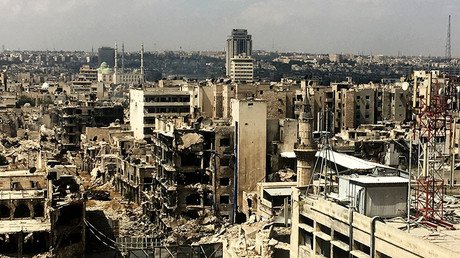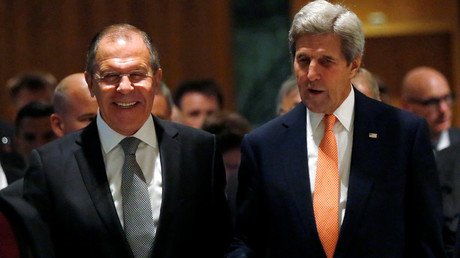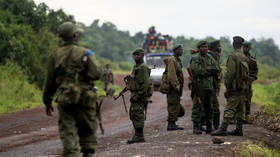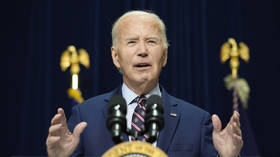US officials offer mixed reactions to Syrian ceasefire, ready to blame Russia, Assad for failures
Washington has expressed uncertainty at whether the Syrian ceasefire will work or not. The State Department is cautiously optimistic, while the White House wants more assurances from Russia. Meanwhile, the Pentagon appears skeptical.
The seven-day ceasefire, beginning with a 48-hour truce, went into effect Monday “at sundown” in Damascus.
According to the deal, the US and Russia will create a joint center to define terrorist targets, called the Joint Intelligence Committee or JIC, that will allow the two countries to coordinate military actions without input from Syria. Extremist organizations such as Islamic State (IS, formerly known as ISIS/ ISIL) or Fateh al-Sham (formerly Jabhat Al-Nusra) are excluded from the cessation of violence and will be subjected to further attacks.
The deal “may be the last chance to save a united Syria,” Secretary of State John Kerry warned.
He appeared cautiously optimistic after the ceasefire began, however.
"The earliest reports are that there is some reduction in violence as well as a few reports of fighting here and there though it is far too early to draw any definitive conclusions," Kerry told reporters at the State Department. "There will undoubtedly be reports of violations here or there but that is the nature of the beginning of the ceasefire almost always."
Although the ceasefire has officially begun, the US and Russia have not yet begun coordinating military actions against IS or Al-Nusra.
“Before any of that cooperation begins, we need to see Russia make good on the commitments they’ve made in the context of this arrangement to prevail upon the Assad regime to observe the cessation of hostilities,” White House press secretary Josh Earnest told reporters. “And by reinvigorating the cessation of hostilities, we can reduce the violence, increase the flow of humanitarian assistance and provide space for political negotiations.”
The US isn’t willing to give up control in Syria, but if the ceasefire goes south, it will blame Russia for not controlling Syrian President Bashar Assad. On the other hand, the Russians say that if the ceasefire falls apart, it will be the Americans’ fault for not controlling the opposition. Both sides blame the other for the failures of previous ceasefire attempts.
During a “brief period in February and March where there was a cessation of hostilities” that failed, State Department spokesman John Kirby said, “the Assad regime didn’t live up to the commitments that they made” by attacking opposition forces and “in some cases, innocent civilians.”
“They were pretty bold about announcing that they were going to go and bomb hospitals, targeting civilians, until they could get some of these groups to surrender,” he added, blaming the Russians for not preventing Assad from violating that ceasefire.
This time will be different, Kerry promised.
"As soon as US-Russia strikes begin, then the Syrian regime will be prevented from flying combat missions over areas in which the legitimate opposition is present," Kerry said.
One group, Ahrar Al Sham, is reportedly refusing to abide by the ceasefire. The State Department maintains that it has been in contact “with the moderate opposition,” and is “not aware of any single group that has come out rejecting or in opposition [to the ceasefire].”
“Now that said,” Kirby continued, “we understand that certain of them have doubts, have concerns. We recognize that. That's why we’re in constant contact with them. We also are taking a pretty clear-eyed approach here. I mean, nobody is saying for a moment that this isn’t going to be difficult.”
At the Pentagon, officials involved in preparing for those strikes are skeptical that the truce will hold this time.
"Everyone is prepared for rapidly implementing this agreement if it crosses that threshold, but we are also ready to walk away if it doesn't hold," a US defense official told Agence France-Presse. "There's a lot of plans, but it still hasn't come together."
"I have no reason to be very optimistic that this [truce] will hold. If it does, then it's our obligation to make this work as best we can," the official added.
The US has backed away from previous demands that Assad’s air force be grounded completely, allowing for the Syrian military to strike in areas where Al-Nusra and Islamic State (IS, formerly ISIS/ISIL) have been operating outside the JIC-enforced area. Such an agreement would prevent Assad from bombing civilians or opposition groups, as government forces have done during past cessations of hostilities, Kerry said.
This time around, the objective of the agreement “was to limit their combat operations in such a way that they could not hit opposition targets or civilian targets, but that, if they were able, willing, intending to target Nusra, which is outside the cessation of hostilities, that would still be permissible,” Kirby said, expanding on Kerry’s earlier remarks. “But the whole purpose for the JIC is to allow for a measure of compliance and monitoring and pre-coordination of strikes that they would do against [al-]Nusra, so that it’s not done without visibility of both Russian and US planners.”














